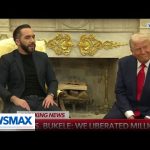President Trump is crafting a new tariff framework aimed at cool gadgets like computers, smartphones, and semiconductors, signaling that the light-touch approach on certain electronics imported from China could soon vanish. This announcement comes at a time when the president is showing a willingness to adjust tariffs for devices made in the Asian superpower. Apparently, flexibility is the name of the game. Who knew tariffs could be as flexible as a rubber band?
While the Trump administration recently outlined exemptions for some electronics from the staggering 125-145% tariffs, it did not take long for the ever-watchful president to jump into the fray. Trump asserted that products like semiconductors need special treatment because they are tied to national security concerns. Trying to dismiss complaints of excessive taxes, the administration maintains that a nuanced approach, or “bucket” system, is necessary—though it’s clear some would say they’re just shoveling out exemptions when it suits their bottom line.
Wall Street reacted positively to this news, with investors seeing it as an opportunity for tech giants like Apple with their extensive operations in China. Tech stocks took off, but at what cost? The growing confusion in the market seems to have put a temporary hold on the escalation of tariffs—who could argue that this rollercoaster of taxes is anything but a chaotic thrill ride for the U.S. economy?
President Trump said to expect a tariff framework for computers, smartphones and semiconductors "very soon," a sign the carveout from China tariffs for certain electronics will not last long. https://t.co/U6RP8fi3fs
— The Washington Times (@WashTimes) April 14, 2025
In the midst of this trade kerfuffle, President Trump remains steadfast in his mission to turn America into a manufacturing powerhouse again. He reassured the public, amid the tumult of rising bond yields, that the journey to reducing trade deficits and boosting American jobs will take some time. After all, Rome wasn’t built in a day, and neither will America’s economic independence be achieved overnight. It’s all part of a grander strategy to ensure that the nation remains prosperous.
While Trump is applying pressures to bring manufacturing back to the U.S., the reality is that someone still has to pay those tariffs. Most of the time, it ends up being American companies that get stuck with the bill, which might just lead to consumers seeing higher prices at checkout lines across the country. It seems like a “tax on imports” is just a fancy way of saying “tax on you.” However, the ramifications of these increasingly convoluted trade policies promise levels of confusion not seen since the last time people tried to interpret tax bracket regulations.
As the tariff tango continues with China, eyes are focused not only on America but also on Beijing’s dealings with the global scene while they hold back crucial exports of rare earth minerals. With both leaders seemingly in a standoff, travelers might not be the only ones holding their breath waiting for negotiations to spark anew. One thing is clear, though: this tariff saga is less about winning and losing and more about who can hold out the longest in the waiting game that seems to have turned into both a chess and poker match.




